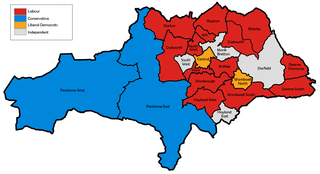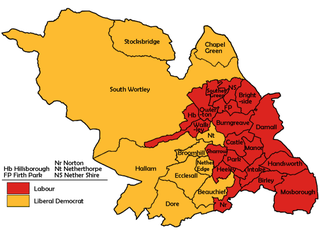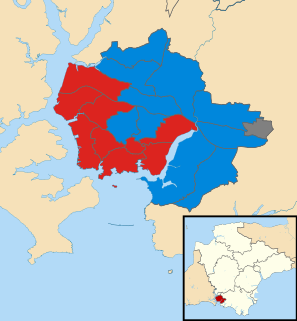One third of City of Bradford Metropolitan District Council is elected each year, followed by one year without election.

Elections to Wigan Council were held on 4 May 2006. One-third of the council was up for election and the Labour party kept overall control of the council. Overall turnout was 29.2%.
Elections to Manchester Council were held on Thursday, 7 May 1998. One third of the council was up for election, with each successful candidate to serve a four-year term of office, expiring in 2002. A vacancy each in Ardwick and Harpurhey were also being contested. There were two Labour candidates for Barlow Moor ward, the result of de-selected Labour Councillor Arthur Maloney securing an official Labour Party nomination before he was replaced by a new candidate. The Independent Labour candidates stood as Labour Peace 2000. Overall turnout was 20.5%, with Labour retaining control of the council.

The 2006 Camden Council election took place on 4 May 2006 to elect members of Camden London Borough Council in London, England. The whole council was up for election and the Labour Party lost overall control of the council to no overall control.
Elections to Calderdale Metropolitan Borough Council were held on 2 May 2002. One third of the council was up for election and the Conservative party lost overall control of the council to no overall control. The total turnout of the election was 32.16%. The winning candidate in each ward is highlighted in bold.
Elections for the London Borough of Merton were held on 7 May 1998 to elect members of Merton London Borough Council in London, England. This was on the same day as other local elections in England and a referendum on the Greater London Authority; in the latter, Merton voted in favour of creating the Greater London Authority by 72.2% on a 37.6% turnout.
The 2002 Hull City Council election took place on 2 May 2002 to elect members of Hull City Council in England. The whole council was up for election with boundary changes since the last election in 2000 reducing the number of seats by 1. The Labour party lost overall control of the council to no overall control.

The 2002 elections to Southwark Council were held in the London Borough of Southwark, England, on 2 May 2002. The whole council was up for election, with boundary changes since the last election in 1998, reducing the number of seats by one. There were 63 seats in 21 wards. The Council moved from Labour controlled to no overall control, with a minority Liberal Democrat executive. Turnout was 26.2%.
Elections to Manchester Council were held on Thursday, 6 May 1999. One third of the council was up for election, as well as a vacancy in Chorlton, with each successful candidate to serve a four-year term of office, expiring in 2003. The two Independent Labour candidates stood as "Peace 2000 England's Republic", a slight alteration on the previous year's "Labour Peace 2000". Overall turnout was up marginally from the previous year at 21.9%. The Labour Party retained overall control of the Council.
Elections to Manchester Council were held on Thursday, 4 May 2000. One third of the council was up for election, with each successful candidate to serve a four-year term of office, expiring in 2004. The two Independent Labour candidates stood again as "Peace 2000 England's Republican". Overall turnout fell slightly to 20.5% and the Labour Party retained overall control of the council.
Elections to Manchester Council were held on Thursday, 2 May 2002. One third of the council - alongside a vacancy in Moss Side - was up for election, with each successful candidate to serve a two-year term of office, expiring in 2004, due to the boundary changes and 'all-out' elections due to take place in that year. The Independent Labour candidates stood as "Independent Progressive Labour". Overall turnout rose to 24.4% and the Labour Party retained overall control of the Council.

The 2000 Barnsley Metropolitan Borough Council election took place on 4 May 2000 to elect members of Barnsley Metropolitan Borough Council in South Yorkshire, England. Prior to the election, Labour has suffered a by-election loss in South West and two defections to Independent. One third of the council was up for election and the Labour party stayed in overall control of the council.

The 2002 Barnsley Metropolitan Borough Council election took place on 2 May 2002 to elect members of Barnsley Metropolitan Borough Council in South Yorkshire, England. One third of the council was up for election and the Labour party stayed in overall control of the council.

Sheffield City Council elections took place on 2 May 2002. One third of seats were up for election. Since the previous election, the Liberal Democrats and Labour had each suffered one defection - Ronald Shepherd left the Labour grouping to sit as an Independent and Lib Dem Matthew Dixon defected, firstly as an Independent and then to the Conservatives. In this time an earlier Lib Dem defector, Trefor Morgan, also changed from an Independent to Liberal.
The 1999 Wealden District Council election took place on 6 May 1999 to elect members of Wealden District Council in East Sussex, England. The whole council was up for election and the Conservative party stayed in overall control of the council.
Elections for the London Borough of Merton were held on 3 May 1990 to elect members of Merton London Borough Council in London, England. This was on the same day as other local elections in England and Scotland.

The 2015 Plymouth City Council election took place on 7 May 2015 to elect members of Plymouth City Council in England.
Elections to Central Bedfordshire Council were held on 7 May 2015, along with the United Kingdom general election, 2015 and other local elections. The whole council was up for election, with each successful candidate serving a four-year term of office, expiring in 2019.

The City of Bradford Metropolitan District Council elections were held on Thursday, 4 May 2000, with one third of the council up for election. Labour lost control of the council to no overall control.

The 2002 Hammersmith and Fulham Council election took place on 2 May 2002 to elect members of Hammersmith and Fulham London Borough Council in London, England. The whole council was up for election and the Labour party stayed in overall control of the council, despite winning fewer votes than the Conservative party.











